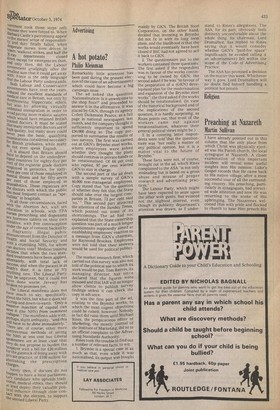Advertising
A hot potato?
Philio Kleinman
Remarkably little attention has been paid during the present election ti5 the case of an advertisement which could have become a big campaign issue. The ad asked the question
'Nationalisation: Is it unwelcome to the shop floor?' and Proceeded to answer it in the affirmative. It was placed by GKN, through its agency Collett Dickenson Pearce, as a full page in national newspapers last month, and the company thought it sufficiently important to spend 00,000 doing so. The copy purported to summarise the results of two surveys. The first was carried out at GKN's BrYmbo steel works, where employees were asked whether they thought the plant should continue in private hands or be renationalised. Of 66 per, cent who replied, 97 per cent wanted GKN to stay in charge.
The second part of the ad dealt
with a sample survey of GKN's 80,000 non-managerial employees. Copy stated that "on the question of whether they felt that the State should take over the largest companies in Britain, 73 per cent said 'no.'" This second part attracted the attention of the Sunday Times, which pointed out some of its shortcomings. The ad had not explained that the State ownership question was part of a much longer questionnaire supposedly aimed at establishing employees' reaction to a message from GKN's chairman, Sir Raymond Brookes. Employees were not told that their answers would be used for political publicity.
The market research firm, which carried out this survey was also not told of the political use to which its work would be put. Tom Reeves, its managing director, has si.r?ce declared that the figures were misused and that IAR will no longer allow clients to publish survey findings unless it can check the copy in advance. It was the first part of the ad, relating to the Brymbo works, to which the most cogent objections could be raised, however. Nobody in fact did raise them until Michael Rines, the perspicacious editor of Marketing, the montly journal of the Institute of Marketing, did so in an official complaint to the Advertising Standards Authority. .Rines took the trouble to find out a number of relevant facts, to wit: I. Brymbo is a special case in as much • as that, even while it was nationalised, its qutput was bought mainly by GKN. The British Steel Corporation, on the other hand, decided that investing in Brymbo did not fit in with its long term plans, and the likelihood is that the works would eventually have been closed if BSC had not agreed to sell it back to GKN. 2, The questionnaire put to the workers contained three questions. The first asked if the respondent was in favour of the works continuing to be owned by GKN; the second asked if he was "in favour of the preparation of a (GKN) development plan for the modernisation and expansion of the Brymbo steel works"; the third asked if the works should be renationalised. (In view of the historical background and of the implications of the second question, it is hardly surprising, as Rines points out, that most of the workers came out against renationalisation, whatever their general political views might be.) 3. In a covering letter respondents were tolcrthat the questionnaire was "not really a matter of any political opinion, but it is a matter vital to the future of Brymbo." These facts were not, of course, brought out in the ad, which Rines complained to the ASA "is not only misleading but.is based on a gross abuse and misuse of proper research and advertising practices."
The Labour Party, which might have been expected to seize upon the affair with gusto, has evinced not the slightest interest, even though its publicity department's attention was drawn, as I under
stand, to Rines's allegations. The ASA, for its part, obviously feels distinctly uncomfortable about the whole thing. Its chairman, Lord Drumalbyn, has replied to Rines saying that it would consider whether GKN's "paid-for space" (significantly he avoided calling it an advertisement) fell within the scope of the Code of Advertising Practice.
The ASA has promised a decision on the matter this week. Whichever way it goes, Lord Drumalbyn will no doubt find himself handling a political hot potato.
































 Previous page
Previous page